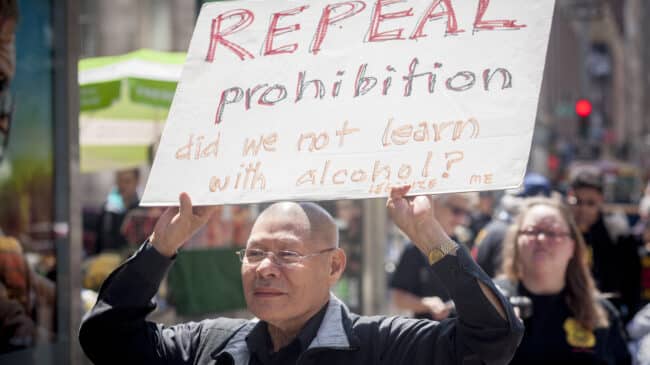Few debates in public policy are as controversial as the treatment of drugs. Some drug legalization advocates argue that individuals should be free to make their own choices in a liberal society. Others lament that drugs shouldn’t be legal because drug addiction can lead individuals down a dark, twisted path that impairs their freedom and ability to make rational choices. And still others want to ensure, as best we can, that potentially addictive drugs are not available to children. These are all valid concerns and viewpoints.
The new Drug Legalization Handbook, published by Reason Foundation, the Law Enforcement Action Partnership, Students for Sensible Drug Policy, and the National Coalition for Drug Legalization, shows that strict prohibition has failed to alleviate these concerns.
“As this volume demonstrates, we should view drug legalization not as a social danger to fear, but as an opportunity to save lives and reduce crime,” says Veronica Wright, founder of the National Coalition for Drug Legalization and author of multiple chapters in the handbook. “It’s time that we start showing love and compassion for our friends, family, and neighbors who are drug users. Incarceration is not the proper public health response for drug abuse or recreational use of drugs.”
Despite its illegality, drug use is a common, everyday activity in rural and urban America. Overdoses have reached all-time highs. Law enforcement efforts to restrict access to drugs are failing in every way, contributing to America’s over-incarceration problems and creating market opportunities for drug cartels and other unsavory actors in the illicit market.
“America’s war on some drugs has caused innocent people to die, destroyed families, corrupted institutions, destabilized the governments of neighboring countries, and, in the process, fueled the development of ever more dangerous drugs on the black market. It is the most destructive public policy in modern times,” says Jeffrey A. Singer, M.D., senior fellow at the Cato Institute and author of a chapter of the Drug Legalization Handbook.
A legal and regulated market for drugs—even hard drugs—could better address the underlying concerns of every relevant party in the drug debate. Harm reduction policies can help individuals overcome potential addiction without incarcerating them and ruining their lives. Legalization with quality controls can help eliminate contaminants and reduce overdoses, like the fentanyl overdoses all over the country’s news programs. Simple regulations focused on reasonable age limits, public education programs, and packaging and labeling guidelines would help restrict access to adults.
“Repealing the federal laws that treat drugs differently than other products is the best way forward. There is no need for the government to design rules and regulations for the sale of drugs; markets arise when needed. Letting the market solve a problem created by the government is the best possible outcome,” Dr. Jeffrey Miron, vice president for research at the Cato Institute and the director of graduate and undergraduate studies in the Department of Economics at Harvard University, and Erin Partin, research associate at the Cato Institute, write in their chapter of the handbook.
“After a century of misinformation about the true nature of the drug problem, it’s time to set the record straight and realize the vision of freedom that ‘We, the People,’ believe in,” says Michael Galipeau, a contributor to the handbook and national cannabis liaison for the National Survivors Union. “This handbook represents our best efforts to create a path forward and let it be the start of a more important conversation about human rights and the universal right of people to alter consciousness.”
Even if it seems counter-intuitive, a legal market is a better regulator of human behavior than blanket criminalization of all drugs. As Veronica Wright puts it in the Drug Legalization Handbook’s foreword:
America needs to recognize that we will not see a reduction in violent crimes until we legalize drugs. All drugs. We need to recognize that we will not see a reduction in opioid overdoses until we legalize opioids like heroin. I ask that all who read this handbook keep an open mind. What is presented is unconventional, but it is clear that the current approach to drug use has failed. Use a critical eye to evaluate the guidance shared in this handbook. I hope to open your heart and inspire you to join our movement to abolish drug prohibition.
Ultimately, the United States should return to a society that respects the freedom and independence of all individuals to live as they see fit so long as they don’t harm others. This handbook gives policymakers ways to make that happen.

